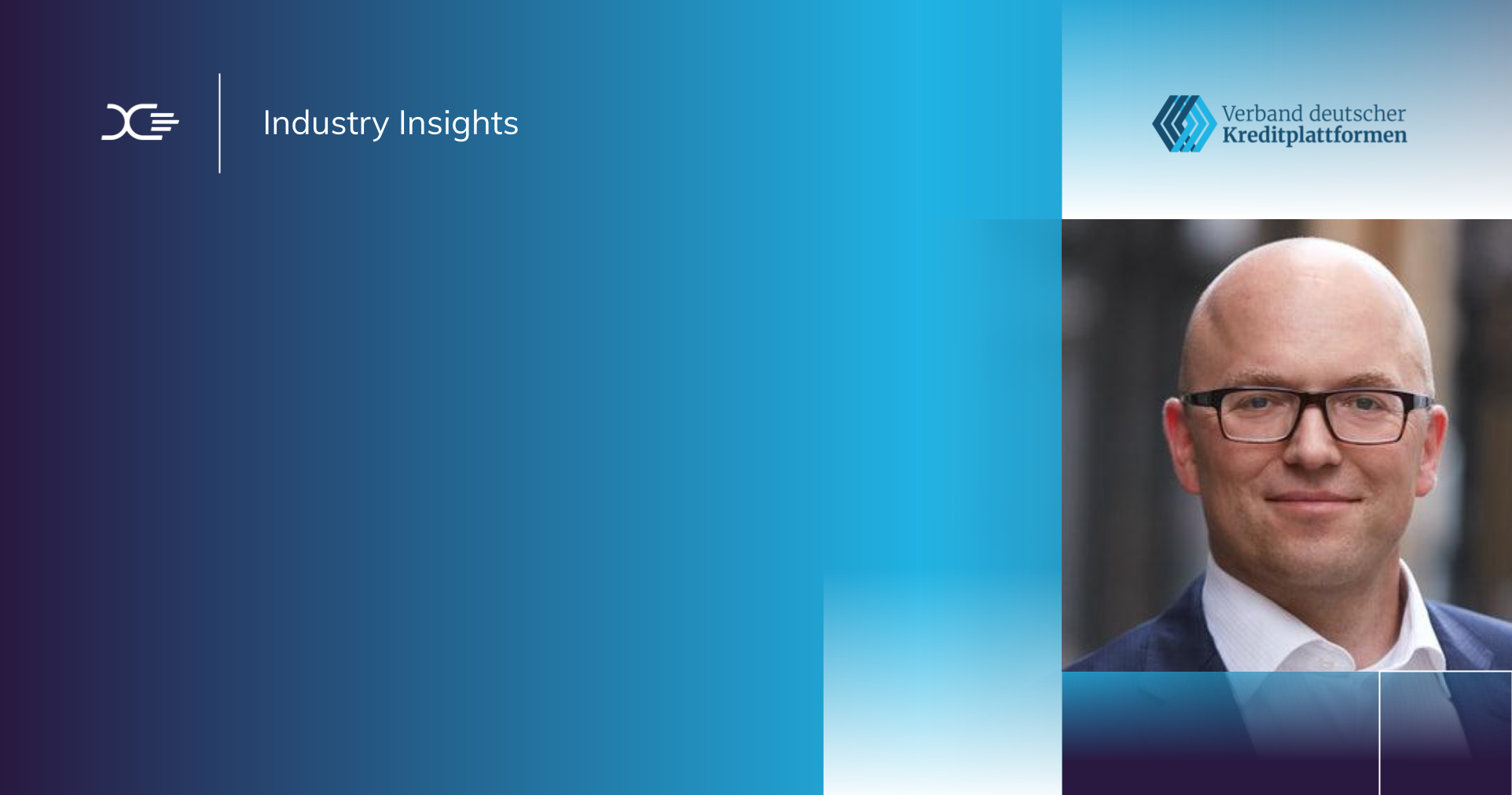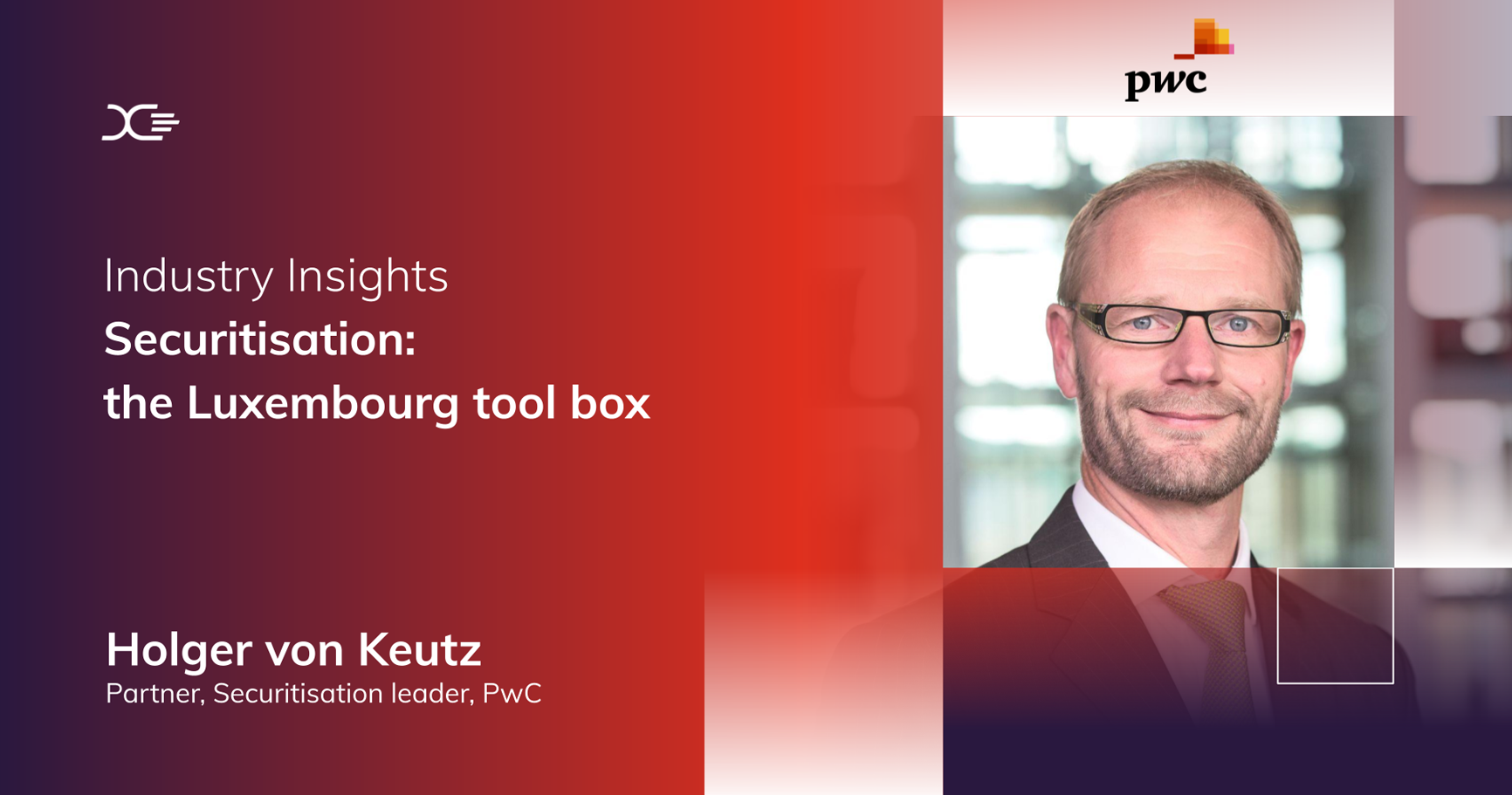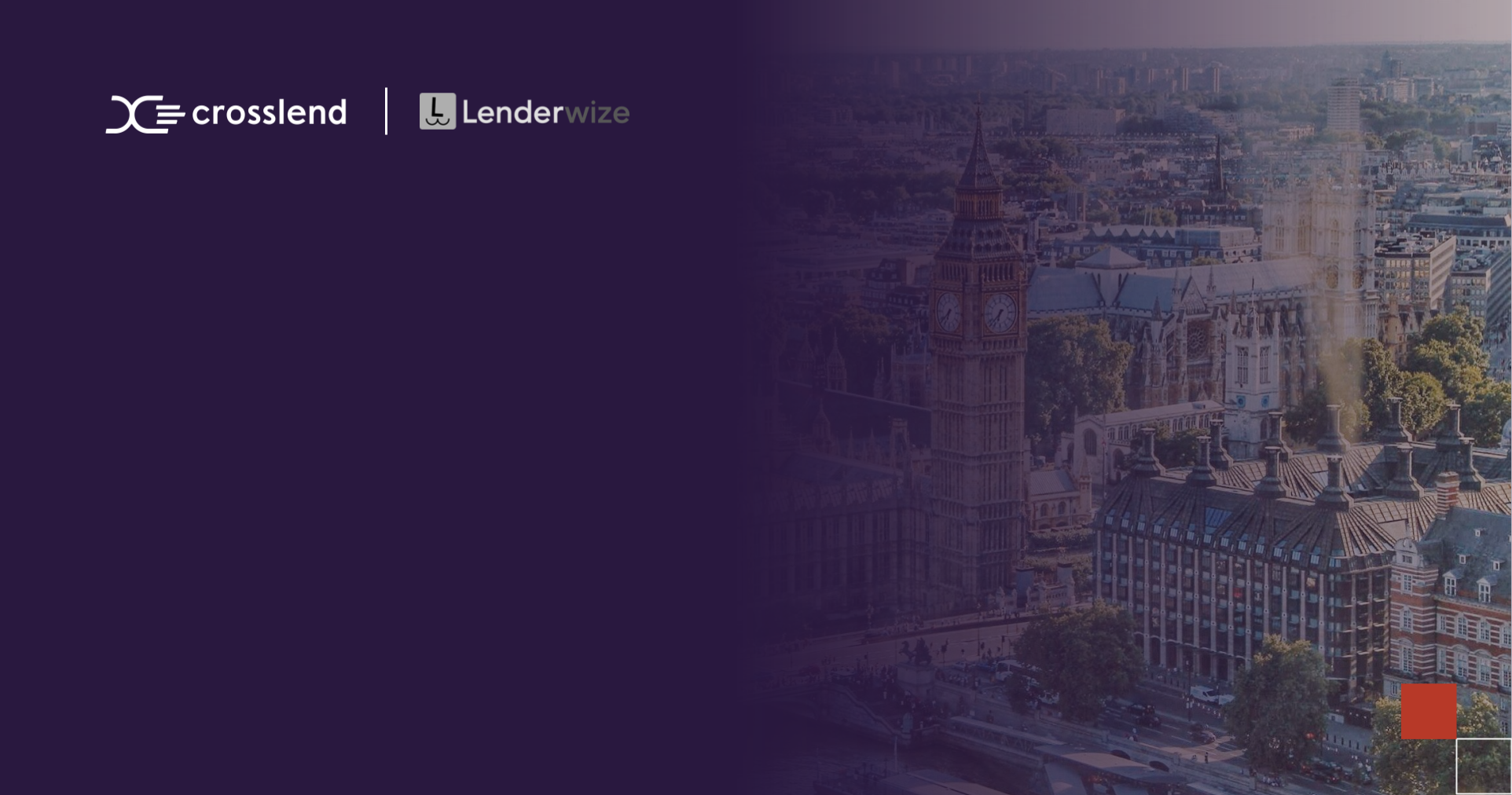Building industry standards for lending platforms in Germany
Alternative lenders are playing an increasingly important economic role in funding businesses, in Germany and across Europe. In 2021, the amount of lending to businesses through German marketplaces totaled 11.4 billion euros. At the same time, growing participation on the funding side by institutional investors has led to a growing demand for professional standards to govern the conduct of members, explains Constantin Fabricius, Managing Director of the Association of German Lending Platforms (VdK). We spoke to Constantin to find out more.
Marco Hinz: Hi Constantin, can you please introduce the VdK? Who are your members, and what is your main focus?
Constantin Fabricius: We are the Association of German Lending Platforms [Verband deutscher Kreditplattformen], VdK. As an organisation, we carry out the normal functions of a trade body, such as public affairs, networking and public relations. But in addition, we are also active in developing standards for our industry. Why? Simply put, there are no general guidelines that the industry is obliged to adhere to. It was recognised by our four founding members – creditshelf, auxmoney, Funding Circle, and Kapilendo [now Invesdor] – that it was important to have a set of specified standards, going beyond a simple guide. Overall, these should benefit those on both the borrowing and the investor side. We already have industry standards in place for several important areas – compliance, non-discriminatory behaviour, complaints management, and uniform industry data. At the moment, we are working on developing standards for areas that include outsourcing, risk management, claims management, Environmental, Social, and Governance (ESG), and uniform data requirements.
When you look closely at these – you can find them on our website – you can see that in terms of details and quality, these standards go far beyond a mere codex. They encompass requirements for building up an organisation in areas such as compliance. Our goal is to build up a comprehensive rule book for our members, which will imply a high level of assurance both to borrowers and to investors. This is the most important project of our organisation.
Marco Hinz: Looking at German lending platforms, what are their main activities and which areas of the market do they service?
Mr. Fabricius: First and foremost, I need to stress that our trade body represents only the interests of the debt side of the business, not the equity or mezzanine forms of platform business. With regard to the debt story, we have on the one side investors, ranging from retail investors to institutional investors such as pension funds or even banks. On the other side, we have four forms of debtors: municipalities, consumers, real estate, as well as businesses, covering the range from small to medium to large entities. Different instruments include senior loans, factoring, bonded loans, bonds, and debt funds.
Our figures show that in 2021, German lending platforms originated business financing to small, medium, and large entities in the amount of 11.4 billion Euros, so this is a significant activity.
Marco Hinz: Internationally, Germany is known for its Mittelstand sector. What is the situation there for these kinds of companies around the availability of credit from banks?
Mr. Fabricius: For SME lending, what we see as one of the major consequences of the Basel package [announced in October 2021 by the European Commission] is that the segment of non-rated businesses will have to overcome greater loan hurdles. And, since a large majority of banks have already adapted their credit policy to this framework, it is difficult for SMEs to obtain loans. This is shown in the data – for instance, looking at the latest credit research by KfW.
Overall, SME lending has become more cost-intensive for banks. And at the same time, banks are facing other challenges for their core business, such as overhauling their IT. Business directors have to decide whether they increase or maintain their levels of lending, or rather, if they invest to improve their digital capacity. But certainly there is a funding gap for SMEs in Europe that needs to be filled, and alternative lenders are the relevant players in this space. The wind is blowing in our business model’s favour, because corporate credit is still largely undigitised. And in addition to speed, digitisation is our strength.
Marco Hinz: SMEs can cover a large spectrum, from small businesses up to those with a turnover in the range of 50-200m euros. Which are most affected?
Mr. Fabricius: What we see from the Basel package is that all companies which do not have a rating from a ratings agency will face higher loan hurdles with banks. Given that the vast majority of companies in Germany do not have a rating, that’s a big challenge for the Mittelstand sector, especially now after the pandemic where growth is in the focus. Obtaining a rating can be quite cost intensive and it is not an option for everyone. One alternative is to approach marketplace lenders and take out a senior-loan or a bonded loan for example. Specifically, the advantage of the bonded loan compared to a bond is that having a rating is not necessary at all.
Marco Hinz: How do you explain this phenomenon? The Basel rules were strengthened following the Global Financial Crisis and have reduced the attractiveness of SME lending, but businesses still need to borrow.
Mr. Fabricius: The European legislator believes that there is a systemic risk linked to banks. This is a global trend: around the world, legislators have been trying to limit the capacity of banks to write loans, because they believe that the capacity of banks to leverage on capital is a systemic risk. If banks aren’t the only lenders anymore, who will fill the gap? The view of the European Commission is that the gap can only be filled by the private sector. They have even done a consultation on an SME referral scheme, whereby banks would have an obligation to refer rejected SME loan applications to alternative lenders. As part of the consultation they shared data on loan approval rates.
In 2020 in Germany, 79% of SMEs that applied for bank loans relevant to their enterprise received the loan, while the remainder, 21%, either had their application rejected, received only a partial loan, or their application remained pending.
This was slightly better than the EU27-wide figure of 70% approval, and far better than the worst performing countries such as the Netherlands or Greece. Our view is that the private sector is needed here to enable business and economic growth, including job creation.
This also applies to other aspects of the economy. For instance, we have the European Green Deal: it is absolutely clear today that the banks won’t have the capacity to write the full amount of loans needed for the Green Deal. The private sector is seen as having an important role to play. The VdK believes that first and foremost it is the private sector that should drive this, because there is enough institutional and private capital available. The problem is that we do not have common rules that apply to all investors or platforms across the European community. That is why we at the VdK believe that the finalisation of the Capital Markets Union (CMU) is so important. It will show that the alternative sector is as relevant as banks, and is able to fill gaps where banks are unwilling or unable to lend.
Marco Hinz: You’ve had nordIX, the first institutional investor, join the association, and they now have a board seat. CrossLend is also there, and has a role to play on the funding side. What advantages are there to having input from investors? What is their focus?
Mr. Fabricius: Almost 95% of our members, the lending platforms, deal exclusively with institutional investors. Although there are also lending platforms that do still receive funding from retail investors, it’s institutional money which plays the bigger role on the funding side. Given that, we believe that institutional investors are a trigger for developing stronger industry standards. They have a high interest in areas such as compliance, transparency, and ESG, precisely because many of these investors – such as nordIX – are highly regulated, and therefore face continual scrutiny from regulators. The viewpoint of highly regulated institutional investors, as ordinary members of our association, will feed into our development of industry standards, and ultimately have a positive impact on the industry as a whole.
 Philipp Kriependorf (auxmoney), Tim Thabe (Creditshelf), Marco Hinz (CrossLend), Claus Tumbrägel (nordIX), Jens Siebert (Invesdor).
Philipp Kriependorf (auxmoney), Tim Thabe (Creditshelf), Marco Hinz (CrossLend), Claus Tumbrägel (nordIX), Jens Siebert (Invesdor).
Marco Hinz: Why are investors so interested in investing or funding lending platforms?
Mr. Fabricius: Given the low interest rates, it’s a challenge for anyone to find profitable ways to invest money and find a match with an appropriate risk profile. When looking for options outside of equity or mezzanine forums, retail and institutional investors have found that lending platforms can offer a good performance and deliver attractive yields.
A joint study by our members creditshelf and Exaloan shows that investing via marketplace lenders remains an option for investors’ portfolios, as the performance offers expected return potential as well as added value in the asset mix due to low correlation with other asset classes.
Marco Hinz: One topic that is quite important for investors is ESG. However, when it comes to the typical loan on a lending platform, it can be hard to quantify this using currently available data. How do you see this developing?
Mr. Fabricius: It is very important as there is a strong demand for ESG options both from institutional and retail investors. It is the understanding of our board that we cannot ignore this development, otherwise we risk losing investors. A recent study in Germany by Mazars highlighted how important institutional investors consider evidence of ESG activities to be when it comes to investment decisions. Therefore, we are currently developing an ESG industry standard that is compatible with the business models of our members. It should be simple for investors and debtors alike. It fills the gap left by the EU Taxonomy, which does not in particular cover marketplace lenders.
Marco Hinz: And speaking generally about the industry standards you’ve developed, how are these communicated to end users? Are these designed to benefit both borrowers and investors?
Mr. Fabricius: Absolutely! Claims management, for example, is important for borrowers. Having uniform standards in areas such as how to deal with delinquencies is very important for investors as well. Complaints management is another aspect which affects both debtors and investors. And this is where we set the benchmark. For example, while the European Securities and Markets Authority (ESMA) believes that initial complaint processing in connection with the EU crowdfunding regulation may take 10 days, we want to see initial processing within two days.
Once all standards are completed and thrashed out, and once they have been adopted by the general assembly, all ordinary members will have to undergo a test, using a third party such as an auditor. Only once a member has passed all these tests with a score of 100% will they receive the quality assurance mark.
We see this as a unique way to ensure quality and transparency across all the different kinds of lending platform businesses.
Follow CrossLend on LinkedIn for more Originator Spotlights, and our latest insights on private debt, finance and innovation.
Any views expressed in this interview are the personal views of the interviewee, and do not necessarily reflect the position of CrossLend or its employees. This article should not be construed as investment advice, or relied upon by anyone as legal, accounting, compliance or tax advice, or for any other purposes. This article is not to be construed, under any circumstances, by implication or otherwise, as an offer to sell, nor as a solicitation to buy securities.
Related articles
Securitisation: active management option to boost Luxembourg hub
The overhaul of Luxembourg’s securitisation laws introduced a number of changes, notably allowing for active management and a broader [...]
Originator Spotlight/Lenderwize
A fast-growing trade finance platform, Lenderwize specialises in invoice financing in the digital economy. Currently its platform provides its [...]
Digital lending emerges as an important sub-segment of private debt
Amid increasing breadth within the private debt asset class, specialised investors can allocate capital to sub segments in a bid [...]








